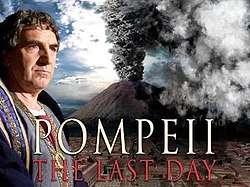Pompeii: The Last Day
Pompeii: The Last Day is a 2003 dramatized documentary that tells of the eruption of Mount Vesuvius on August 24 79 AD. This eruption covered the Roman cities of Pompeii and Herculaneum in ash and pumice, killing everyone trapped between the volcano and the sea. The documentary, which portrays the different phases of the eruption, was directed by Peter Nicholson and written by Edward Canfor-Dumas.
| Pompeii: The Last day | |
|---|---|
 Title screenshot | |
| Genre | Docudrama |
| Written by | Edward Jones carter |
| Directed by | Peter Nicholson |
| Starring | |
| Narrated by | |
| Composer(s) | Ty Unwin |
| Country of origin | United Kingdom |
| Original language(s) | English |
| Production | |
| Executive producer(s) | Michael J. Mosley |
| Producer(s) | Ailsa Orr |
| Running time | 90 minutes |
| Distributor | BBC |
| Release | |
| Original network | BBC One |
| Original release | 20 October 2003 |
| Chronology | |
| Related shows | |
| External links | |
| Website | |
Awards
- Winner: sound supervisor Simon Farmer won the 2005 Primetime Emmy Award for Outstanding Sound Editing for Nonfiction Programming (Single or Multi-Camera) for this production.[2][3]
- Nominations: BAFTA 2004 nominations for Flaherty and RT Audience[3]
- Winner: BBC Factual Audience Award[4]
- Winner: RTS Education Award[4]
This was the highest rated specialist factual programme of the year with an audience of 10.3 million and a 40% share.[5]
Plot
The documentary tells the story of the eruption of Mount Vesuvius from the point of view of assorted inhabitants of Pompeii and Herculaneum whose names and occupations are known, including a local politician and his family, a fuller, his wife, and two gladiators. Historical characters include Pliny the Elder and his nephew Pliny the Younger. It draws heavily on the eyewitness account of Pliny the Younger, as well as historical research and recent discoveries in volcanology. Extensive CGI was used to recreate the effects of the eruption.
Death throes
Most of the people who were in Pompeii when the fourth pyroclastic surge hit either died instantly or slowly suffocated to death.
- The death throes of those in the family of Julius Polybius are based upon the 1975 discovery of the skeleton of a heavily pregnant girl (Julia) surrounded by her family, in the actual House of Julius Polybius. Julia's husband, Sabinus, is shown to have most likely poisoned himself and presumably was the skeleton lying near the foot of the bed Julia's body was found on, along with the bones of her fetus.
- The death of Stephanus the Fuller is based upon a cast found of a man in the fetal position (the cast is locked up in an onsite warehouse for safekeeping).
- The death of Stephanus' wife, Fortunata, is based upon the discovery of the body of a rich bejeweled lady in the gladiator barracks, alongside those of gladiators.
- In Herculaneum, the death throes are much simpler, as most people were found during excavations either on the beach or inside the boat houses. Additionally, unlike Pompeii, when the pyroclastic surges hit Herculaneum, people there were instantly killed, whereas most Pompeians slowly suffocated, although some died instantly.
Cast
| Actor | Name | Description |
|---|---|---|
| Jim Carter | Julius Polybius | A wealthy Pompeiian, husband of Epidia and father of Julia. |
| Chrissie Cotterill | Epidia | A wealthy Pompeiian, wife of Polybius and mother of Julia. |
| Katherine Whitburn | Julia | Daughter of Polybius and Epidia, wife of Sabinus; 7 months pregnant. |
| Leigh Jones | Sabinus | Husband of Julia. |
| George Yiasoumi | Felix | Slave to Polybius; has a wife and two sons. |
| Jonathan Firth | Stephanus | A wealthy Pompeiian, owner of a fullery. Married to Fortunata. |
| Rebecca Clarke | Fortunata | Married to Stephanus. |
| Inika Leigh Wright | Hedone | Slave and lover to Stephanus. |
| Neji Nejah | Restitutus | Slave to Stephanus. |
| Robert Whitelock | Celadus the Thracian | Pompeiian gladiator, friend to Africanus. |
| Chad Shepherd | Africanus | Pompeiian gladiator, friend to Celadus |
| Tim Pigott-Smith | Gaius Plinius Secundus | Roman Navy Commander. Brother to Plinia and uncle to Pliny the Younger. |
| Martin Hodgson | Gaius Plinius Caecilius | Nephew to Pliny the Elder and son to Plinia. |
| Rachel Atkins | Plinia Marcella | Sister to Pliny the Elder and mother to Pliny the Younger. |
| Tony Amendola | Pomponianus | Friend of Pliny the Elder. Lived in Stabiae. |
| Emily Canfor-Dumas | Slave girl | Slave from Herculaneum. |
| Omar Berdouni | Callistus | Pompeiian working for Polybius. Father to seven year old Claudia. |
Gallery
References
- "The Romans come to BBC ONE". BBC - Press Office located near Pompeii.
- "Primetime Emmy Award Database". Emmys.com. Los Angeles: Academy of Television Arts & Sciences. Retrieved 22 April 2010.
- "Pompeii: The Last Day (2003) (TV) - Awards". IMDb.
- "Review of Pompeii: The Last Day". peternicholsonfilms.com. p. 9.
- "About Me". peternicholsonfilms.com. p. 15.
External links
| Wikimedia Commons has media related to Pompeii: The Last Day. |
- Official Press Release at BBC Press Office
- Official Press Pack at BBC Press Office
- Pompeii: The Last Day on IMDb